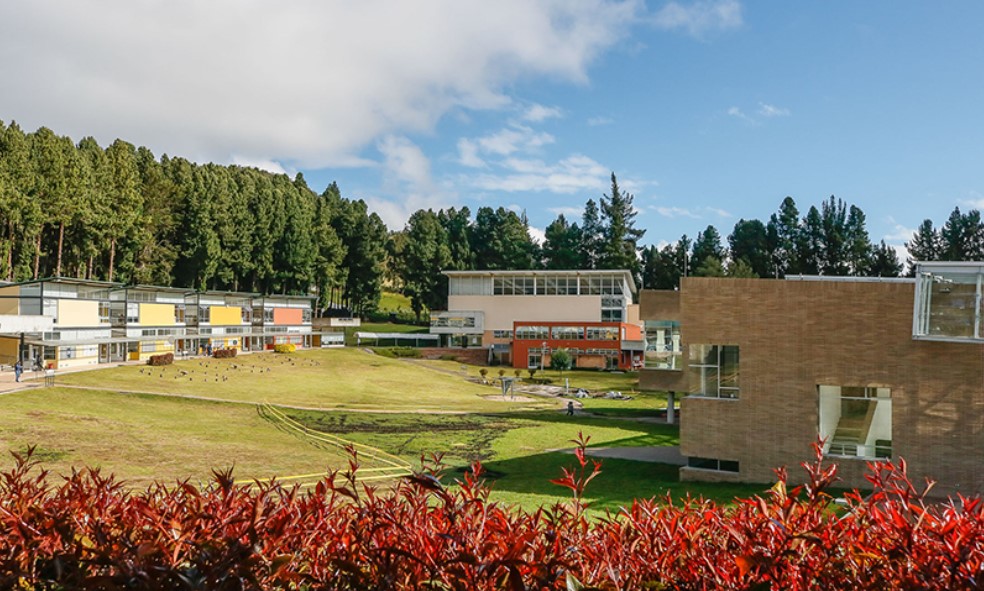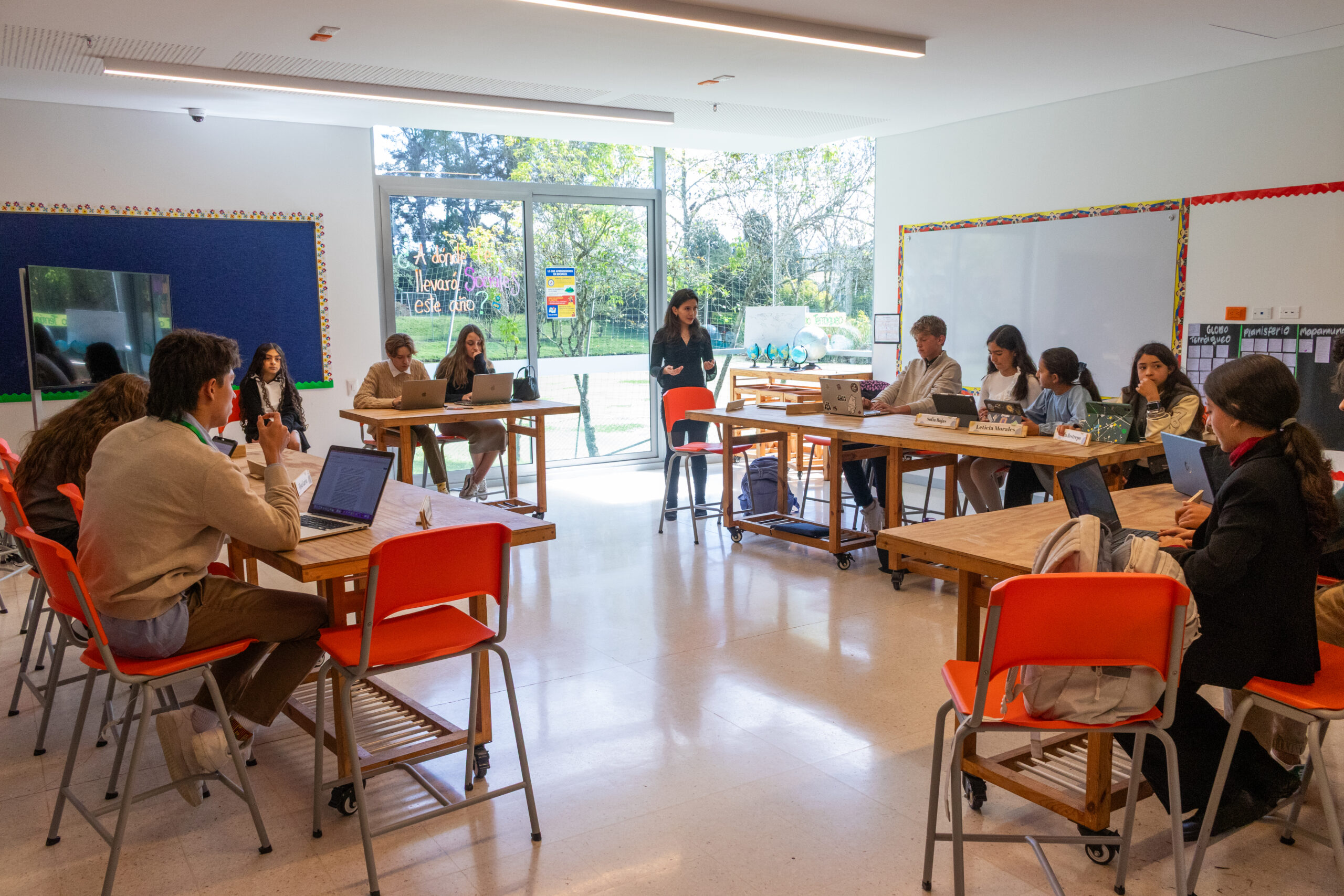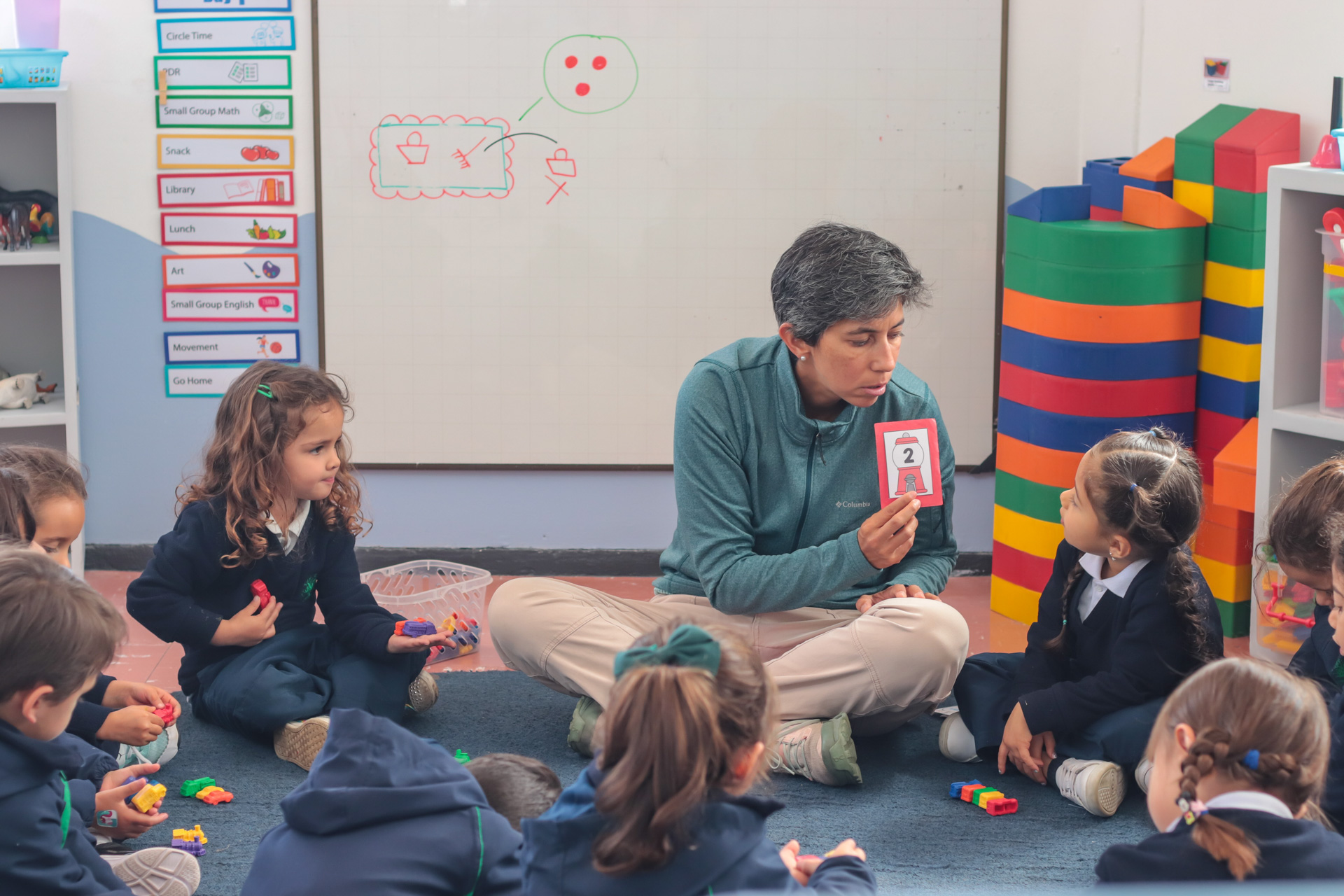CATEGORÍAS
Los Alcaparros: Transforming Today’s Students into Tomorrow’s Leaders & Engaged Citizens of the World
Colegio Hacienda Los Alcaparros (CHLA) is a Colombian private school located in La Calera. It educates children and young people through an educational project based on ethical, humanistic, scientific, and aesthetic principles. The project embraces a human development perspective that respects differences and individual processes. The aim is to train citizens of Colombia and the world for the challenges of the 21st century.
Notably, CHLA holds the distinction of being the first school in Colombia to incorporate arts, music, self-expression, physical development, social and emotional growth, and a project-based approach into its core curriculum. This innovative approach has been instrumental to the school’s success. It remains dedicated to its progressive vision of education, a commitment that has profoundly impacted education throughout Colombia.
The Foundation Story
On April 10th, 1992, CHLA was established in Bogotá by Rosa Cecilia Caro Restrepo, her sister Constanza Caro de Casas, and their mutual friend, María Teresa Botero. These three educators, deeply committed to serving their community and driven by their conviction that education is an indispensable catalyst for personal and national development, embarked on a journey that gave rise to the school. Their vision was rooted in the profound interplay between academic instruction and practical training. They emphasized a “learn by doing, feeling, and thinking” approach, all while upholding core human values. Notably, music (following the Suzuki Method) and the arts were given a special place in the curriculum, underscoring the holistic nature of their educational philosophy.
“At the heart of our mission is the unwavering commitment to accompany each student on their learning journey. Our aim is to nurture their innate potential, enabling them to learn how to learn, how to apply knowledge, how to think critically, how to coexist harmoniously, and ultimately, how to be. This comprehensive approach equips them to engage with life meaningfully, fostering connections, equality, and sustainability. Our graduates emerge as responsible global citizens, understanding the shared humanity that binds us all,” explains Rosa Cecilia Caro Restrepo, Director of CHLA.
In its initial chapter, CHLA opened its doors to 36 students and 11 dedicated educators. The campus, nestled in the hills of Suba, north of Bogotá, encompassed preschool and the first three grades of primary school. Director Rosa Cecilia Caro Restrepo was Steering the Educational Project, supported by Rector Marta Cecilia Gómez. Today, CHLA has flourished, finding its expansive home across a ten-hectare campus in the mountainous terrain of La Calera, Cundinamarca. With pride, it now boasts an enrollment of over 800 students.
Pedagogical Models: Starting from Curiosity to Creativity to Strengthen Learning
According to Director Rosa Cecilia Caro Restrepo, the nurturing environment of active learning and appreciation serves as a catalyst for unlocking the full potential of CHLA’s students. As a result, a single overarching philosophy guides the entire educational endeavor: CHLA comprises four distinct schools (Preschool, Primary, Middle School & Baccalaureate), each meticulously tailored to cater to the diverse needs of varying age groups. Collaboratively overseen by the Academic and Human Development Departments, these schools synergize perspectives to fulfill CHLA’s mission. This mission encompasses delivering education that upholds the standards of rigorous academics, emotional equilibrium, autonomy, and responsibility.
The confluence of three core subjects paves the way for diverse viewpoints on issues, fostering curiosity, igniting creativity, sparking imagination, and cultivating critical thinking within the students:
- Active Learning: CHLA champions active learning, empowering every student to flourish. Each student is allowed to choose, express ideas, formulate plans, and undertake projects that stem from their interests. This dynamic approach also encompasses decision-making, verbal expression, and thoughtful introspection, reinforcing the philosophy of holistic development.
- Musical Learning: Rooted in the heart of CHLA’s inception, musical learning encapsulates the fusion of academic education and practical training. Music, a quintessential embodiment of active learning, only resonates and becomes audible when brought to life through instruments or voice. In essence, music thrives when it is created.
- Human Development: CHLA implements policies and philosophies that nurture personal growth. This includes fostering a culture of respect for diversity, nurturing human connections, providing tools for conflict resolution, embracing transformative processes, and adapting to change – both for children and their families.
Integrating Technology in the Learning & Teaching Process
The ICT infrastructure is an indispensable cornerstone of every facet of academic and administrative operations at CHLA. It serves as the catalyst for fostering digital engagement and interactivity among students, educators, and staff. This robust framework facilitates the retrieval, manipulation, and dissemination of digital information and underscores the bedrock for cataloging and systematizing academic and administrative data. These comprehensive datasets, in turn, serve as the foundation for generating insightful reports, conducting research, and driving informed decision-making. Beyond its internal scope, this technological backbone seamlessly links the school and its community with the global landscape, amplifying CHLA’s reach and impact.
Central to these endeavors is DataWise – a strategic approach that CHLA employs to drive judicious and impactful decision-making, thereby refining its operational efficiency. In essence, DataWise embodies the pursuit of optimal methods to execute a multitude of activities that shape the school’s identity. This unwavering focus is laser-targeted on the educational journey of CHLA’s students. A profound understanding is gleaned by delving into their performance metrics, thus illuminating the path toward enhancing pedagogical processes. Notably, this encompasses the evolution of teaching practices that nurture academic growth.
Expanding beyond the classroom, the DataWise approach encompasses the meticulous review of the school’s organizational and administrative mechanisms. These endeavors stand as pillars of support for the multifaceted academic and formative endeavors undertaken by CHLA. In essence, this holistic strategy ensures that every dimension of the institution aligns harmoniously to fulfill its mission and objectives.
Prioritizing Environmental Consciousness & Sustainability through Programs & Initiatives
Nestled within a picturesque valley, ensconced amidst the verdant mountains of the La Calera Municipality near Bogotá, CHLA’s campus is a sanctuary nurtured by the collective efforts of employees, educators, and students. The heart of this sanctuary is ‘La haciendita,’ an expanse that encompasses a farm and a garden. Here, the symbiotic relationship between humanity and the environment flourishes. Through dedicated endeavors, an ecological corridor thrives, trees are tenderly planted, and the Quebrada del Ají is vigilantly protected. This commitment to ecological harmony is underscored by a self-sustaining water system comprising a deep well, an intricate rainwater collection network, a judicious water treatment plant, and innovative recycling practices. The cycle culminates with treated water redirected for irrigation and sanitation while a vigilant fire protection system stands ready. Moreover, an emergency power plant ensures continuity and innovative recycling and material reuse initiatives exemplify CHLA’s commitment to sustainability.
Further fortifying this ethos is the School Environmental Project (PRAE) at CHLA. This encompassing initiative seamlessly weaves into the daily fabric of the school, anchoring itself within two transcontinental, enduring projects led by the institutional program “Citizens of the Earth.” These endeavors hold the shared objective of nurturing students’ recognition, appreciation, and comprehension of three fundamental facets: firstly, the intricacies of ecosystems and biodiversity, both locally and globally; secondly, the intricate challenges that stem from these interconnected systems; and thirdly, the pressing individual and collective responsibility to safeguard our planet as stewards of Earth.
In the annals of CHLA’s history, 2012 marked the inception of a remarkable venture known as GRULAC Junior. Birthed and nurtured by CHLA, this regional entity, an affiliate of the United Nations, galvanizes the youth of Latin America and the Caribbean. It provides a platform for comprehensive engagement encompassing study, analysis, dialogue, negotiation, and preparation for meaningful participation in United Nations conferences. With an ardent focus on environmental concerns, particularly the ramifications of climate change, GRULAC Junior amplifies the voices of the regional youth on a global stage. This intersection of local advocacy and global awareness resonates deeply.
The evocative Sponge Project stands as a testament to CHLA’s dedication to transcending academic silos. Converging students from the Middle School, this transdisciplinary initiative harnesses the collective force of diverse programs, imbuing them with a united purpose. Through the lens of paramos and high wetland ecosystems, students delve into an immersive exploration, cultivating not only understanding but a profound sense of value for these vital habitats. A core objective of the Sponge Project is to craft actionable proposals that contribute tangibly to safeguarding and preserving these intricate ecosystems.
Global Engagement & Impact
The Global Connections program at CHLA connects the Alcaparros community – students, teachers, staff, and parents – with individuals, places, and cultures from different regions of Colombia and around the world through multiple key programs such as relationships with national and international organizations, world-in-Alcaparros-in-the-world, visits, and student-teacher exchanges, study abroad, and keeping up with international standards.
Likewise, CHLA collaborates closely with various national and international partners, fostering support and cooperation. Some of its key allies include Cognia, Academica International Studies, High/Scope Educational Research Foundation, College Board (N.Y, N.Y., USA), Suzuki Association of the Americas, GRULAC-United Nations, University of Minnesota-Institute of the Environment, CERN, Instituto de Cultura Brasil Colombia-IBRACO, and specific agreements with Educational and Development Entities.
Fostering a Diverse & Inclusive Learning Environment
Since its foundation in 1992, CHLA has been committed to inclusive education, which is deeply embedded in its vision of human development by considering each individual as a whole being at every stage and in its choice of education based on embracing diversity and understanding that everyone is unique and different.
Similarly, embracing diversity and individual differences, alongside principles of freedom, personalization, and participation, form the basis for conceiving inclusion as an inherent feature of CHLA’s educational approach, catering to the various ways of being and existing of each student. In addition, CHLA ensures attention and care for diverse modes, paces, and timelines of learning, the varying interests and distinct ways of comprehending the world, and the different ways of feeling and acting of each student, all of which are present in all processes and activities at the school.
Going one step ahead, CHLA has also established ‘The Learning Center’ on its campus, which is responsible for enhancing the quality of the educational experience, promoting developmental growth, improving academic achievements, fostering independence, and developing social skills to enable each student’s life projects in the future. The function of this center is to support academic, psychological, and social processes by identifying and removing barriers to learning and participation. Apart from this, specialized speech therapists and occupational therapists with expertise in pedagogy evaluate students’ performance and develop personalized strategies and support therapies, if necessary, to strengthen learning habits, academic leveling, and integration into the classroom.
Promoting a Sense of Community & Encouraging Parent Involvement
CHLA envisions the ongoing construction of an appreciative community and hence, understands the need to strengthen this foundation day by day as the fabric of the social tapestry it contributes to. It is, therefore, resonated through CHLA’s daily tasks in the school environment, reinforced by activities, programs, and specific processes that further enhance the resilience of its community.
- Peer Learning
At CHLA, students in each grade are grouped into small clusters to create close bonds that facilitate mutual support and care in learning and socio-emotional development. Furthermore, each Kindergarten 4 to fifth-grade student has a “big brother or sister” in middle school or high school who, during various activities throughout the year, takes the initiative to get to know their “younger sibling,” establish camaraderie and look out for each other. Additionally, the educational outings that students undertake, whether as part of the “Sin fronteras por Colombia” program, as part of ongoing projects, or related to their subjects, provide excellent opportunities to strengthen bonds and camaraderie among students.
Apart from these, from Kindergarten 4 to eleventh grade, during classes, daily life, and specifically designed times for conflict management, teachers and students model constructive ways to resolve conflicts, emphasizing the value of attentive listening and timely, substantiated, and respectful communication. The “Houses” program in Middle School, which includes sixth to ninth-grade students, aims to create inclusive environments where shared interests are evident and differences are acknowledged as enriching for personal and social development.
In addition, teachers and employees – among themselves, with each other, and with students and families – live out and embody the spirit of appreciative community that CHLA fosters.
- Family Matters Centre
The primary purpose of the Family Matters Center is to accompany families and caregivers in developing their strengths, in which family processes that contribute to the formation of children and young people are rooted and nurtured. This space seeks to further strengthen the bridges created between families and the school to guarantee the comprehensive development of each of its students. It also helps to establish a direct communication channel with the School and between families, educational and cultural workshops, recreational spaces, and much more.
CHLA Director Rosa Cecilia Caro Restrepo shares, “Here, we closely support each of our students in their school training process, and we want parents and caregivers from home to be in the front row supporting the entire process.”
Extra-Curricular Activities
CHLA has a varied extracurricular program comprising more than twenty workshops that bring its students closer to the arts, sports, and other disciplines to offer a well-rounded education. For this purpose, it has the appropriate facilities for developing these activities, which take place during the school year in two semesters. Student participation is completely voluntary, and at the end of each semester, the school makes a presentation for the parents in which the product of their work and the learning obtained is evidenced. These extracurricular activities include body and movement, voice and instruments, discovering science, and arts and crafts.
Student Success Stories
One of the major achievements of CHLA is the constitution of the GRULAC Jr., an initiative to unite youngsters in Latin America and the Caribbean towards issues that directly affect their region and to participate and act to effect change. In the 11 years of GRULAC Jr., the school has grown the participation of other schools and countries, reaching last year to have an assembly of 8 countries and 18 schools. A humongous feat. In addition, the Brain Initiative has become a forum and a reference for educators in Colombia to keep up with the most current developments and issues in education and the brain.
Similarly, in 2001, 14 high school graduates – 7 women and 7 men – became the first graduating class of CHLA. Each year more and more join this group of alumni, who always remain part of the school community; they are its extension, as ambassadors to the world as they carry the Alcaparros seal in their being.
Celebrating Diverse Cultures & Years-Old Traditions
Throughout the year, concerts and musicals open to parents and friends of CHLA are held, including the Christmas concert and a musical by preschool students, recitals by students based on the instruments they are preparing, Café Concert featuring students from Middle School and High School, and musicals involving students from all schools. Every two years, the school organizes the Suzuki Concert, which brings together violinists, pianists, guitarists, cellists, and flutists from various schools and colleges in Colombia and Latin America that use the Suzuki methodology for teaching, centered around the interpretation of Suzuki repertoire.
Moreover, it is CHLA students’ tradition to celebrate Christmas with the students of I.E.R.D. El Salitre. With the support of their teachers, CHLA students plan and organize activities such as games, art creations, and musical performances, which they share with the students of El Salitre during a morning at the CHLA’s campus. Likewise, celebrating Spirit Day is an Alcaparros tradition aimed at strengthening the bonds of the community, fostering friendships and care, and developing empathy, teamwork, and communication skills in a learning space.
The Path to a Brighter Future
Moving forward, CHLA aspires to maintain the focus, rigor, and coherence of each discipline needed to build a robust basis of knowledge that allows its students to build new knowledge. With such a basis, students can make connections across disciplines by transferring and applying knowledge to other contexts. Therefore, with an interdisciplinary mindset, students can build and understand the “big ideas,” concepts, and relationships that help build a better picture of their complex world. The school also strives to offer the opportunity of choice within disciplines and through interdisciplinary projects that engage students and give them control of their learning journeys.














